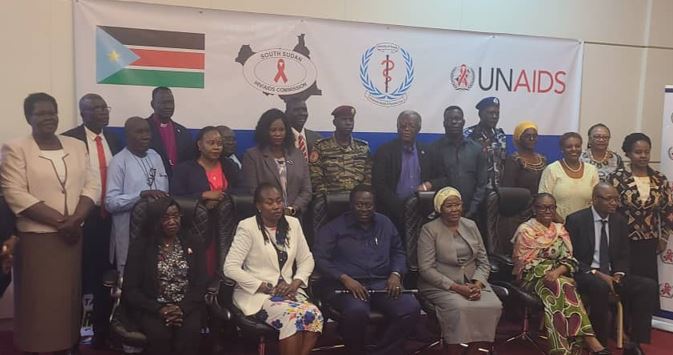The South Sudan HIV/AIDS Commission (SSAC) and the Ministry of Health, with support from UNAIDS, Tuesday organized a high-level dialogue to address HIV prevention.
The event brought together national leaders, health officials, and stakeholders to underscore the nation’s commitment to combating HIV/AIDS, and to mobilize political will and resources towards a more robust prevention.
Vice-President Hussein Abdelbagi Akol opened the dialogue, emphasizing the government’s commitment to ending Aids as a public health threat.
“The government is mindful that HIV remains a major public health challenge in South Sudan, with approximately 140,000 people living with HIV and 8,100 new infections in 2023,” he said.
Akol commended the continuous support from partners such as UNAIDS, UNDP, and the Global Fund, which have contributed to a 45% reduction in new infections since 2010.
However, he acknowledged that South Sudan’s HIV prevention faced significant hurdles, including underfunding and reliance on external support. He urged stakeholders to leverage South Sudan’s membership in the Global HIV Prevention Coalition (GPC) to accelerate progress.
“I urge all HIV actors to utilize this platform to learn and to share lessons,” he stated, stressing the importance of tackling stigma and encouraging community-led prevention.
Health Minister Yolanda Awel highlighted the urgent need for practical actions beyond “beautiful words on paper”.
She pointed out the disparities in HIV prevention services, especially in the northern and central zones, where infections were reportedly higher due to limited healthcare access and cross-border movement.
“Our data is not accurate, but is actually scary,” Awel remarked, adding that more support was concentrated in the southern areas, while “high-infection zones” in the north received minimal attention.
Awel called for a review of outdated health policies and regulations and underscored the importance of localized, culturally appropriate prevention. She appealed to parliament for greater budget allocation for health services, citing that only 1.3% of the national budget was currently devoted to health, of which 0.9% went to the Ministry of Health.
“If we are not investing in the health sector, we are losing ground in our fight against preventable diseases,” she stated.
Central Equatoria State Health Minister Najua Juma highlighted the importance of coordinated efforts and stakeholder collaboration at both the national and sub-national levels, under the Governor.
“In this regard, as the Government of Central Equatoria State, under the leadership of the Governor, we gather here today to show our solidarity, support, and commitment as stakeholders toward HIV/AIDS prevention,” Juma stated.
She explained that the dialogue’s objective was to engage high-level political leadership and stakeholders on the state of HIV prevention, building political commitment for implementing a robust HIV prevention roadmap.
Juma also emphasized the need to raise awareness at the national and sub-national levels and aligning South Sudan with the Global Prevention Coalition’s roadmap and its five pillars of HIV/AIDS prevention.
She called for a concerted effort to strengthen the fight against HIV/AIDS and meet the ambitious global 95-95-95 targets by 2030.




